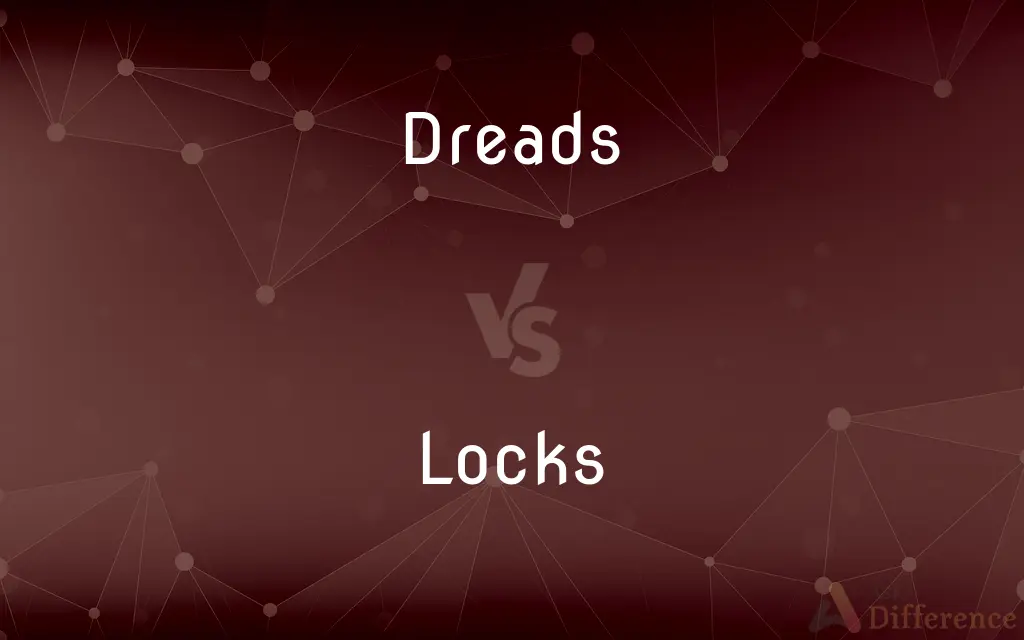Dreads vs. Locks — What's the Difference?
By Fiza Rafique — Published on December 9, 2023
Dreads and Locks are often used interchangeably but primarily differ in cultural context and methods of formation; Dreads have roots in various global cultures, while Locks are tied to Rastafarianism.

Difference Between Dreads and Locks
Table of Contents
ADVERTISEMENT
Key Differences
Dreads, short for dreadlocks, is a term widely recognized around the globe. They're formed when hair intertwines and mats over time. Locks, often seen as synonymous with dreads, holds a more specific cultural connection to the Rastafarian movement in Jamaica.
While Dreads can emerge naturally or be cultivated, they exist in numerous cultures and civilizations, from Ancient Greece to Indian ascetics. Locks, being closely tied to Rastafarian beliefs, are often seen as a sign of a vow or covenant and have spiritual significance.
Both Dreads and Locks involve intertwined hair strands but can differ in maintenance methods. Dreads may involve backcombing, twist and rip, or free-forming. Locks, in the context of Rastafarianism, usually involve a natural process without chemical or manual intervention.
Many people use the terms Dreads and Locks interchangeably due to their apparent similarities. However, understanding the profound cultural and historical contexts of Locks within the Rasta community, and the broader historical presence of Dreads, is crucial to distinguishing them.
Lastly, Dreads and Locks both symbolize non-conformity in many societies, with Dreads often representing a broader countercultural movement and Locks, in particular, highlighting a deep connection to Rastafarian beliefs and Afrocentric identity.
ADVERTISEMENT
Comparison Chart
Origin
Global
Rastafarianism, Jamaica
Formation Methods
Various (e.g., backcombing, free-forming)
Natural, minimal intervention
Cultural Significance
Exists in many cultures
Spiritual, tied to Rasta beliefs
Maintenance
Can be high or low depending on method
Usually minimal
Common Associations
Counterculture, non-conformity
Rastafarianism, Afrocentric identity
Compare with Definitions
Dreads
A synonym for dreadlocks commonly used in various cultures.
She decided to get Dreads after her trip to Africa.
Locks
Strands of hair, often referring to curls or pieces.
Her golden Locks shimmered in the sunlight.
Dreads
Intertwined strands of hair that grow together.
His Dreads reached down to his waist.
Locks
Actions of securing or restricting access.
He Locks the door every night before bed.
Dreads
Hair that forms naturally over time without combing.
Living on the island, her hair turned into Dreads.
Locks
A device operated by a key, combination, or keycard and used, as on a door, for holding, closing, or securing.
Dreads
Often represents non-conformity or alternative lifestyles.
Dreads became a symbol of the counterculture in the '60s.
Locks
A section of a waterway, such as a canal, closed off with gates, in which vessels in transit are raised or lowered by raising or lowering the water level of that section.
Dreads
Tangled hair formed by matting or braiding.
Many ancient warriors wore Dreads into battle.
Locks
A mechanism in a firearm for exploding the charge.
Dreads
(colloquial) dreadlocks
Locks
An interlocking or entanglement of elements or parts.
Dreads
A Rastafarian person.
Locks
(Sports) A hold in wrestling or self-defense that is secured on a part of an opponent's body.
Locks
A secure hold; control
The distributor has a lock on most of the market.
Locks
A sure thing; a certainty
His promotion is a lock.
Locks
A length or curl of hair; a tress.
Locks
Often locks The hair of the head.
Locks
A small wisp or tuft, as of wool or cotton.
Locks
To fasten the lock of
Close and lock a drawer.
Locks
To shut or make secure with or as if with locks
Locked the house.
Locks
To confine or exclude by or as if by means of a lock
Locked the dog in for the night.
Locked the criminal up in a cell.
Locks
To fix in place so that movement or escape is impossible; hold fast
The ship was locked in the ice through the winter. She felt that she had become locked into a binding agreement.
Locks
To sight and follow (a moving target) automatically
Locked the enemy fighter in the gun sights.
Locks
To aim (a weapon or other device) at a moving target so as to follow it automatically
"The pilot had locked his targeting radar on the slow-moving frigate" (Ed Magnuson).
Locks
To clasp or link firmly; intertwine or interlock
Locked arms and walked away.
Locks
To bind in close struggle or battle
The two dogs were locked in combat.
Locks
To equip (a waterway) with locks.
Locks
To pass (a vessel) through a lock.
Locks
To invest (funds) in such a way that they cannot easily be converted into cash.
Locks
To arrange or secure (an interest rate) for a loan.
Locks
To end the processing of (a magnetic tape or disk) in such a way as to deny access to its contents.
Locks
To protect (a file) from changes or deletion.
Locks
To become fastened by or as if by means of a lock
The door locks automatically when shut.
Locks
To become entangled or jammed; interlock.
Locks
To become rigid or immobile
The mechanism tends to lock in cold weather.
Locks
To pass through a lock or locks in a waterway.
Locks
Plural of lock
Locks
A head of hair; tresses.
Locks
(colloquial) Dreadlocks.
Locks
Fastening devices, often requiring a key or combination.
She lost the key to her Locks and couldn't access her diary.
Locks
A synonym for dreadlocks, specifically in Rastafarian context.
His Locks were a symbol of his spiritual journey.
Locks
Mechanisms in canals for raising and lowering boats.
The boat waited patiently at the Locks.
Common Curiosities
What's the cultural significance of Locks?
Locks have a spiritual significance tied to Rastafarian beliefs and Afrocentric identity.
Are Dreads and Locks the same?
While similar, Dreads are a global hairstyle, whereas Locks specifically refer to Rastafarian dreadlocks.
Do Dreads need high maintenance?
Maintenance for Dreads can vary based on the formation method and personal preference.
How are Dreads formed?
Dreads can form naturally or through methods like backcombing, twist and rip, or free-forming.
How long can Locks grow?
Like Dreads, Locks can grow very long, often down to the waist or even longer.
Are Locks always linked to religion?
While Locks are deeply connected to Rastafarianism, not everyone with them adheres to the religion.
Are Locks permanent?
While they can last a long time, they're not necessarily permanent and can be cut or slowly untangled.
Did Dreads originate in Jamaica?
No, Dreads have roots in many ancient cultures worldwide, not just Jamaica.
Are Locks natural?
In the context of Rastafarianism, Locks usually form naturally with minimal intervention.
Is it appropriate to call all dreadlocks "Locks"?
While many use the terms interchangeably, "Locks" has specific ties to Rastafarianism.
Do Dreads and Locks symbolize non-conformity?
Both often symbolize non-conformity, with Dreads representing broader countercultural movements.
Can you undo Dreads?
It's possible but can be challenging, and sometimes cutting is the best option.
Do Dreads get dirty easily?
Like all hair, Dreads can get dirty, but with proper care, they can be kept clean.
How are Locks different from braids?
Locks are matted, intertwined hair, while braids are intentionally woven strands of hair.
Why are Dreads sometimes controversial?
Dreads can spark debates on cultural appropriation, especially when worn outside their traditional cultural contexts.
Share Your Discovery

Previous Comparison
Plunderer vs. Pillager
Next Comparison
Haplontic Life Cycle vs. Diplontic Life CycleAuthor Spotlight
Written by
Fiza RafiqueFiza Rafique is a skilled content writer at AskDifference.com, where she meticulously refines and enhances written pieces. Drawing from her vast editorial expertise, Fiza ensures clarity, accuracy, and precision in every article. Passionate about language, she continually seeks to elevate the quality of content for readers worldwide.











































